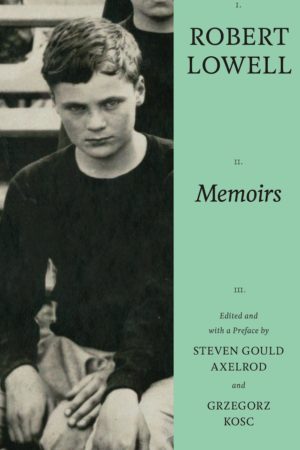Memoirs
by Robert Lowell, edited by Steven Gould Axelrod and Grzegorz Kosc
reviewed by William Doreski
Memoirs, edited by Steven Gould Axelrod and Grzegorz Kosc, is the tenth volume of Robert Lowell material to appear since the poet’s death in 1977. These posthumous publications include a translation of the Oresteia, Collected Prose, Collected Poems, two selected poems, three collections of letters, the original typescript of The Dolphin, and now this autobiographical miscellany. Not a bad showing for a poet whose reputation has supposedly been on the wane. It does bear mentioning, however, that there are repetitions and reprintings among these volumes. Some letters appear in two collections, and some of the memoirs and essays have been published (though sometimes in different form) in Collected Prose.
Lowell would approve. He liked to recycle material, often revising poems into different forms and republishing them. “David and Bathsheba in the Public Garden” from Mills of the Kavanaughs becomes “The Public Garden” in For the Union Dead; “Beyond the Alps,” published in Life Studies, reappears with an added stanza in For the Union Dead. Several earlier poems, including translations, are cannibalized into sonnets for Notebook and History.
Lowell’s revisions and rewritings frequently blur the lines between prose and poetry. Many of the poems of Life Studies began as bits of prose memoir, notably “My Last Afternoon with Uncle Deveraux Winslow,” one of the greatest modern elegies. Reading through Memoirs, we pick up on phrases and images that reappear in poems. A single vivid sensibility is at work in both forms. Lowell followed Pound’s dictum that poetry should be at least as well written as prose, and expressed in his Paris Review interview a desire to write with the clarity and precision of Chekhov.
In both his poetry and his prose, as Memoirs proves, Lowell succeeded in doing just that. “91 Revere Street,” his longest prose fragment, is a masterpiece of exact and atmospheric description, marred only by a repetitiousness that should have been edited out (how often do we have to hear about his father stenciling the trash cans?). And his close attention to family minutiae can be tedious. The fragment entitled “I Take Thee Bob,” a fantasy about his parents’ courtship, invokes too many stray relatives and too much improbable Noel Coward dialogue that supposedly happened a few years before the poet was born to quite work. Lowell may have shelved his partially composed autobiography because he realized that most of it lacks the energy and focus of “91 Revere Street,” and that much of this material does better when compressed and reworked into verse.
The arc of “My Autobiography,” the first section of Memoirs, is a familiar one: the struggle of the young Lowell to escape the thick and unhealthy atmosphere of home (dominated by his aggressive mother) and to substitute his grandfather, Arthur Winslow, for his ineffectual father, Robert T. S. Lowell III. The poems “Dunbarton” and “Grandparents” more vividly invoke this family drama than the prose does. Winslow was manly, self-indulgent, eccentric, and fond of his grandson but often critical of his behavior. Lowell’s mother idealized her father and denigrated her husband, who didn’t know how to deal with either wife or son. Although the editors try, fashionably, to claim that this material questions or undermines white heterosexuality, it seems more accurate to read it as the struggle to discover and shore up the poet’s identity, not to deconstruct it. Either way, Lowell’s memories (or inventions) of his childhood produce some gorgeous imagery and effects that defy conventional interpretation. From the prose fragment “Forty-Four West Cedar Street and Barnstable”:
In Philadelphia I felt like one of the dull larvae which looked like little dill pickles to me when, on a nature outing, I used to rake with my net in the mirthless green underwater of a cow pond. In Boston, no longer a worm, I emerged as a dragonfly and spread my mica wings.
After “My Autobiography,” parts II and III of this collection deal, respectively, with Lowell’s accounts of his manic breakdowns and of life among his fellow poets. Most of the essays on other poets previously appeared in Collected Prose, although here they benefit from fresh editing. Part II, however, contains previously unpublished glimpses of Lowell’s many hospitalizations and their aftermath. These fragments have an emotional rawness and authenticity that complement “Waking in the Blue,” his masterful poem of life at McLean Hospital, and “Home After Three Months Away,” his best poem of recovery.
Lowell once observed that his talent lay in writing short poems. Similarly, his prose talent consisted of writing scenes, not narratives. These scenes are often brilliant, with finely etched prose, astonishing imagery, and a flair for the dramatic. Unlike Henry Adams, a master historian whom he invokes in the opening of “Antebellum Boston,” Lowell exhibits no interest in finding a narrative on which to string his set pieces. This may be another reason for giving up on writing a prose autobiography. But the scenes he has left us, even those in an unfinished state, are illuminating and well wrought. Axelrod and Kosc have done Lowell and his readers a service by bringing this material together in a carefully edited and annotated volume.
Published on November 10, 2022

